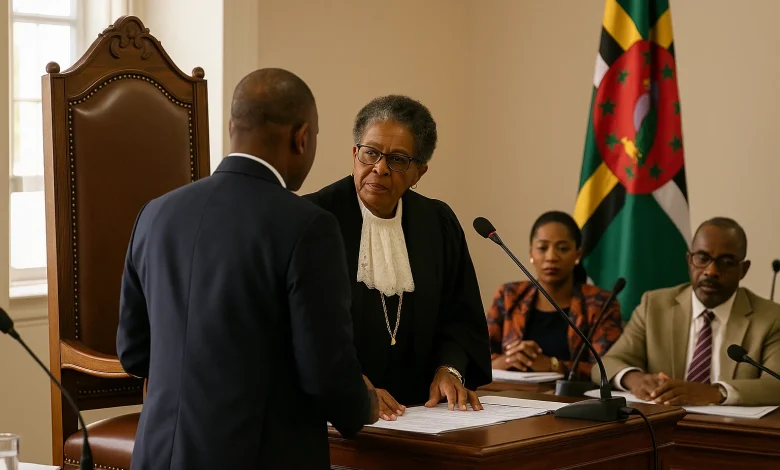Speakers of the House of Assembly

The Speaker of the House of Assembly of Dominica is the presiding officer of the island’s unicameral legislature, responsible for maintaining order, interpreting the Standing Orders, and ensuring fair conduct of parliamentary debates. Elected by members of the House of Assembly, the Speaker serves as an impartial arbiter of legislative proceedings and is a central figure in Dominica’s democratic governance.
Role and Responsibilities of the Speaker of the House of Assembly
The Speaker of the House of Assembly is entrusted with safeguarding the integrity of the nation’s parliamentary proceedings. As the presiding officer the Speaker ensures that debates are orderly, the rules of procedure are applied fairly, and that the rights and responsibilities of members are upheld. While elected by members of the House, the Speaker is expected to act with impartiality, balancing government and opposition voices in service of parliamentary democracy.
The role of the Speaker can be understood in several core functions:
- Presiding over debates: Recognizing members, applying Standing Orders, and ensuring discussions remain relevant and respectful.
- Casting vote authority: Deciding outcomes when the House is evenly split, a rare but critical function.
- Maintaining order: Enforcing discipline, suspending members if necessary, and ensuring the dignity of the House.
- Administrative oversight: Supervising the Parliament Office and staff, authorizing records, and certifying official documents.
- Protecting parliamentary privilege: Safeguarding members’ rights and defending the independence of the legislature.
- Ceremonial duties: Representing the House in communications with the President of Dominica and at official events.
These responsibilities place the Speaker at the center of parliamentary life. By ensuring fair debate and upholding constitutional order, the Speaker reinforces public confidence in the House of Assembly and provides stability within Dominica’s democratic system.
Historical Development
The office of Speaker dates back to the colonial era under the Legislative Council, but it assumed its modern form following independence in 1978. In the years that followed, the position became increasingly important as the island transitioned through political turbulence, constitutional reforms, and the consolidation of parliamentary democracy.
One significant development was the election of Marie Davis Pierre in 1980, who became Dominica’s first female Speaker and authored a definitive text on parliamentary procedure. The long tenure of Alix Boyd-Knights from 2000 to 2020 further strengthened the Speaker’s role as a stabilizing force in parliamentary life.
List of Past Speakers
The history of the Speaker’s office is reflected in the distinguished individuals who have held it, each leaving their mark on parliamentary culture.
- Louis Cools-Lartigue (March 1967 – 1968)
Initially Speaker of the Legislative Council before full parliamentary transition, he guided early legislative continuity amid constitutional change in Dominica’s governance. - Gerald Austin Winston (1968 – 1970)
Took office in the early post-colonial period, overseeing adjustments in parliamentary procedure as Dominica moved toward full self-government. - Eustace Hazelwood Francis (October 1970 – March 1977)
A lawyer and politician, served as Speaker through constitutional consolidation and later became Attorney General, influencing Dominica’s legal and political development. - Fred Degazon (March 1977 – December 1978)
Served during a turbulent transition to republican status; oversaw the House while Dominica prepared its Constitution and independent governance framework. - Pershing Albert Waldron (4 January 1979 – 19 June 1979)
Brief tenure during political upheaval; later became Leader of the Opposition and played a prominent role in parliamentary politics. - Eden Bowers (June 1979 – August 1980)
Led the House during a transitional government period before the 1980 general elections, guiding parliamentary business under evolving party structures. - Marie Davis Pierre (13 August 1980 – 29 December 1988)
First woman Speaker in Dominica, author of Parliamentary Practice & Working Methods, steered legislative modernization during the 1980s. - Crispin Anselm Sorhaindo (16 September 1989 – 24 October 1993)
Later President of Dominica, Sorhaindo stabilized parliamentary procedure as Speaker before ascending to the nation’s presidency. - Neva Augustina Edwards (1 November 1993 – 2 August 1995)
Educator and lay preacher, she emphasized community engagement and accessibility in parliamentary practice during her tenure. - Osborne G. Symes (3 August 1995 – 16 April 2000)
Presided during a period of administrative modernization and expansion of legislative capacity in the late 1990s. - Alix Boyd-Knights (17 April 2000 – 10 February 2020)
The longest-serving Speaker, she guided parliamentary continuity through multiple administrations and reforms over nearly two decades. - Joseph Isaac (10 February 2020 – present)
Former MP turned Speaker, re-elected unanimously. Promised objectivity and balanced oversight in current parliamentary terms.
This succession of Speakers illustrates the evolving role of parliamentary leadership in Dominica’s democracy, bridging colonial governance, independence, and modern representative politics.
Legacy and Continuing Importance
The Speaker of the House of Assembly remains a central figure in safeguarding parliamentary democracy, balancing executive power, and ensuring citizens’ voices are represented through fair debate. From colonial origins to independence and modern governance, the office has evolved into a symbol of legislative authority and impartiality. Each Speaker contributes to shaping institutional culture, guiding lawmaking, and preserving constitutional order. As Dominica advances toward goals of resilience and inclusive development, the Speaker’s role will continue to be pivotal in strengthening democratic traditions and maintaining trust in the parliamentary system.




